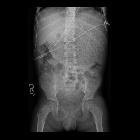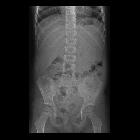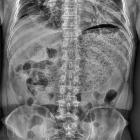gastroparesis


Gastroparesis is a functional gastric disorder caused by abnormal gastric motility with delayed gastric emptying in the absence of mechanical obstruction and results in gastric dilatation.
Clinical presentation
Commonly presents with nausea, vomiting post-prandial fullness, early satiety, weight loss and/or weight gain and epigastric pain.
Pathology
The most common etiologies are :
- idiopathic
- diabetes
- post-surgical: e.g. vagotomy, gastric fundoplication, gastric bypass surgery
- medications: e.g. opiates, Ca-channel blockers, alcohol
- infection: e.g. Chagas disease, Clostridium Botulinum
Radiological features
Plain radiograph
- marked enlargement of the gastric shadow filled with air
Barium study
- decreased or absent gastric peristalsis
- gastric dilatation and delayed emptying of barium,
- debris/barium bezoar and retained fluid
Ultrasonography
- measuring emptying of a liquid meal by serially evaluating cross-sectional changes in the volume of the gastric antrum
CT
marked gastric dilatation in the absence of mechanical obstruction or gastric masses
Radionucleotide imaging
The gold standard of diagnosis is solid meal gastric scintigraphy. Radiolabel egg albumen with Tc-99m sulfur colloid is generally used, the eggs are mixed with 37 MBq Tc-99m sulfur colloid, then it is administered orally, with toasted bread as an egg sandwich.
Measuring simultaneous solid and liquid emptying can be done with a liquid phase, in which water is labeled with 3.7 MBq In-111 DTPA. Data acquisition is performed for 60-120 minutes. Measurement of the half emptying time is the simplest way to assess gastric transit.
Treatment
Management includes dietary modification, prokinetic and anti-emetic medications, and surgical interventions. Gastric electrical stimulation techniques have been introduced (gastric pacemaker).
Differential diagnosis
- gastric outlet obstruction
- pyloric stenosis
- gastric volvulus
- gastric antral web
- gallstones (Bouveret syndrome)
- duodenal or gastric peptic ulcers
Siehe auch:


